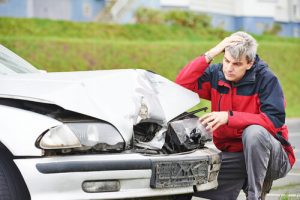
When driving, whether to or from work, running errands, or taking longer trips, most of us feel fairly safe and secure behind the wheel. While we may be aware on some level of the potential dangers we encounter as motorists, we feel confident in our driving abilities and in control of our vehicle and where we are going.
Being involved in a car accident is a traumatic event, as it shatters the illusion of safety and challenges our feelings of being in control. Regardless of whether the injuries are minor or severe, it is possible to have lingering emotional problems in the aftermath of a car crash or collision, particularly problems with grief and fear.
Fear of driving after a car accident is a common problem, but there are steps you can take to understand and overcome your fear to help you get back on the road safely after an accident.
Fear of Driving After a Car Accident
According to the latest motor vehicle accident statistics from the National Highway Traffic Safety Administration (NHTSA), more than 5 million car accidents occur each year in the United States, injuring as many as 2 million people.
The NHTSA lists some common causes of these accidents as speeding, reckless driving, driving while impaired and distracted driving. Even the safest, most capable drivers can end up involved in a potentially serious car accident as the result of encountering other drivers on the road engaging in these types of reckless and negligent behaviors.
Car accident fear and grief are common in the aftermath of an accident and could be indicative of a more serious problem. Post-traumatic stress disorder (PTSD) can occur as the result of any type of harmful or life-threatening event, and according to information on PTSD from the Mayo Clinic, symptoms can occur weeks or even months after an accident. Symptoms of PTSD can vary from mild to severe and are grouped into four general categories:
- Intrusive Memories: This includes flashbacks, which are feelings of reliving the event, as well as having unwanted memories, disturbing dreams, and physical reactions to triggers that remind you of the event.
- Avoidance: This includes avoiding talking about the event and avoiding activities associated with the traumatic event, such as driving.
- Negative Changes in Thinking and Mood: You may feel numb or detached from the things and people around you and lack interest in hobbies and activities you once enjoyed.
- Changes in Emotional Reactions: This may include feeling depressed, angry, or irritable; being easily afraid or startled; having trouble sleeping or concentrating, and engaging in self-destructive behaviors.
If you experience any of the above symptoms, see your doctor right away for a complete diagnosis.

For a free legal consultation,Call (401) 467-2300
Tips for Overcoming a Fear of Car Accidents
Car accident fear and grief can have a significant impact on nearly every area of your life, but there are steps you can take to help overcome these feelings. A fact sheet on car accident-related PTSD from the American Academy of Family Physicians recommends the following tips to help you overcome fear and anxiety:
- Talk about your feelings and what you are experiencing with family and friends. Being open about your accident, your injuries, and any car accident grief or fear you are experiencing can help you recover.
- Be careful not to isolate, and stay active in terms of exercise and activities. Go to all doctor or physical rehabilitation appointments, and get regular exercise and recreation, as your injuries permit.
- Depending on the extent of your injuries, make an effort to resume your normal schedule and routines. Even if it is just getting dressed in the morning or doing a few household chores, keeping a regular schedule will help you feel back to normal quicker.
In addition to the above, learn what you can about defensive driving techniques you can use to help avoid accidents in the future. Although you cannot control the behavior of other drivers, learning different ways to spot potential dangers on the road can help you feel more in control and overcome car accident fear of driving.
Steps to Getting Back Behind the Wheel
In the aftermath of an accident, it is natural to feel reluctant or afraid to get back behind the wheel. Overcoming car accident fear of driving is a major hurdle for many people regardless of the severity of the accident. The Anxiety and Depression Association of America recommends taking the following step-by-step approach to overcoming your car accident fear so that you can once again resume driving activities:
- Start by standing near your vehicle, walking around it, and touching the car, the door, and the door handle.
- Next, take time to sit in the car with the key in the ignition, breathing deeply until you feel at ease.
- Once you are comfortable, start the car and sit there with it idling for 30 seconds or so.
- Put the car in drive, and try driving around a parking lot or small area for five minutes or so.
- As you become more comfortable, work your way up from driving on side streets to driving on main roads.
- Continue acclimating yourself to driving further distances, and begin driving on highways and interstates for longer periods of time.
Throughout this process, go at your own pace and practice deep breathing exercises until all anxiety is gone.

Click to contact our personal injury lawyers today
How a Lawyer Can Help You After a Car Accident
After a car accident, in addition to the car accident grief and fear you are experiencing, you are also likely to be dealing with medical expenses, property damage costs, and even lost wages.
You may be contacted by an insurance company, requesting a statement and offering a settlement for your claim. It is important to remember that the insurance company simply does not have the time and resources to thoroughly investigate your claim, with the result being that claims are often denied or undervalued.
At Gemma Law Associates, our experienced Rhode Island car accident lawyers can assist you in dealing with the insurance company and pursuing the settlement you deserve. In some cases, your interests may be better served through a personal injury lawsuit. Under Rhode Island law, you may be entitled to the following types of compensation:
- Medical expenses and rehabilitative costs
- Lost wages and future loss of income
- Repair or replacement of damaged property
- Compensation for pain, suffering, and mental anguish caused by your accident
- Punitive damages, meant to punish particularly reckless or negligent conduct

Complete a Free Case Evaluation form now
Let Us Assist You Today
If you have suffered injuries in a car accident, contact our experienced Providence, Rhode Island car accident lawyers. At Gemma Law Associates, we provide the compassionate, professional legal representation you need to assist you in pursuing the compensation you deserve. Serving Providence and the surrounding areas, our office can help with a prompt and free review of your case. Call or contact us online today.

Call or text (401) 467-2300 or complete a Free Case Evaluation form

